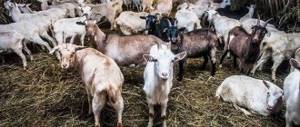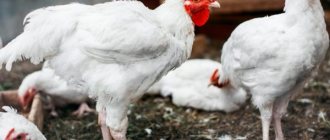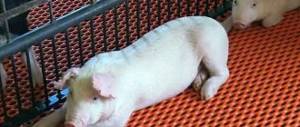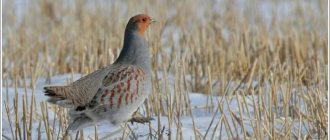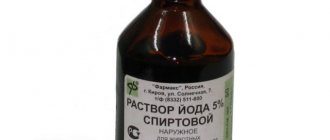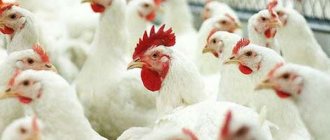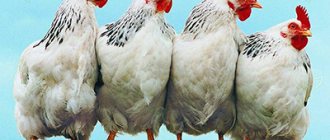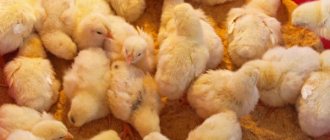2 478
1 comment
4
Author:
Sadchikov Nikolai Alekseevich.
Reading time: 7 minutes
The symptom is characterized by the presence of frequent loose stools, usually with a strong, unpleasant odor.
Diarrhea in chickens can occur at lightning speed, acutely and subacutely. Depending on the cause of the disease, the color of the stool may vary: from white to green.
Diarrhea in chicken chicks can be caused by infectious and non-infectious factors. If diarrhea is detected in a single individual, it is recommended to place it in a separate room for further monitoring of its condition (quarantine).
If diarrhea is caused by the penetration of an infectious agent into the body of chickens, then the following signs appear:
- specific color of litter;
- mass manifestation of the symptom;
- external symptoms.
Gastroenteritis (stomach, intestinal flu)
A disease caused by inflammation of the stomach and small intestine.
Symptoms:
- oppression, weakness;
- blue comb;
- liquid or foamy stools of a yellow-green color , sometimes with admixtures of undigested food;
- elevated temperature.
Treatment:
- diet using easily digestible liquid feed;
- herbal infusions (chamomile, rice or oatmeal infusion);
- glucose (in case of severe intoxication).
How and what to treat diarrhea in chickens
In order to successfully treat diarrhea in chickens, it is necessary to determine the cause. Sometimes, to get rid of it, it is enough to eliminate the factors that led to the gastrointestinal tract disorder.
We recommend reading: Grape snail. Description, features, lifestyle and habitat of the grape snail. The article will tell you in detail about the grape snail, its characteristics and habitat.
What to do first
If a chicken only has diarrhea, without an unpleasant odor, blood, mucus or foam, and there are no other symptoms of disease, then first of all, it is necessary to analyze what she has consumed recently, whether there have been stressful situations in her life, whether she has good living conditions whether there are any harmful herbs and seeds on the walking area. After which the cause should be eliminated - raise the temperature in the chicken coop, remove the source of stress, correctly adjust the diet, introduce mineral supplements, do not let it out onto the grass for a while, etc. If the cause has been established correctly, then the functioning of the digestive system will improve after a while.
In case of poisoning, the bird will need to be put on a gentle diet and given oatmeal or rice water, as well as watered with a sorbent - activated carbon, wood ash.
If the cause cannot be determined, the following steps must be taken:
- Move the scolding bird to a well-ventilated, bright room.
- Disinfect the room with livestock with slaked lime.
- Treat feeders and drinking bowls with boiled water.
- Give the bird a drink with a solution of activated carbon, wood ash, potassium permanganate, and chamomile decoction.
- Replace food with decoctions of rice or oatmeal.
- Administer the drugs Levomycetin, Biseptol.
- This treatment is carried out for 2–3 days.
- In the future, introduce probiotics Emprobio and Flosan with the food.
If the bird is clearly sick and defecates with blood, then immediate removal from the rest of the population, disinfection of the premises and consultation with a veterinarian will be required. In this case, it is necessary to carry out therapy with medications and folk remedies.
Drug treatment
For non-infectious diarrhea, chickens are prescribed the following medications:
- Biseptol - 1/8 tablet three times a day for 5-6 days (for chicken the dose should be 2 times less);
- Levomycetin - 5 tablets per 0.5 liter of water, drink 5 times a day for 2-3 days (for chicken, the dose is 2 times less, frequency - 2-3 times a day).
Depending on the cause, drugs of the tetracycline group (10-20 mg / 1 individual), Biomycin (10-20 mg / 1 individual), Furazolidone (15-20 mg / 1 individual), Sulfadimezin (0.2 mg / 1 individual) can be administered ) and others.
To restore the intestinal microflora, Colibacterin, Lactobacterin, Acylact, Monosporin are used. The dose is calculated according to the instructions. Some infections that cause diarrhea are not economically viable to treat, so most often sick chickens are culled and slaughtered.
Important! Eating eggs and meat from chicken with an infectious disease is strictly prohibited.
If there is a suspicion of the presence of helminths, then it is necessary to carry out treatment for worms:
- Avatecom - 500 g / 1 t of feed, 7 days;
- Levamisole - 2.5 ml intramuscularly for 3 days or 2.5 ml / 1 liter of water in a drinking bowl;
- other drugs (Filixan, Pirantel, Piperazine) depending on the type of parasites.
Treatment with folk remedies
Among the folk remedies used to treat diarrhea are:
- A weak solution of potassium permanganate - 5 g / 1 liter of water, added to the drinking bowl instead of water for 2-3 days.
- Liquid oatmeal.
- Clay mash - dissolve a small amount of white clay in water.
- Oatmeal broth - mix 1 cup with 1 liter of water, cook until ¾ of the liquid remains. Oatmeal broth with the addition of 5-10 drops of red wine is also considered an effective remedy.
- Rice water - mix 1 cup with 1 liter of water, cook for 3-4 minutes.
- Pomegranate infusion - place 10-12 g of dry pomegranate peels in 200 ml of boiling water, close the container with a lid, leave for 25-30 minutes.
- Chamomile decoction - pour 4 tablespoons of chamomile flowers into 0.5 liters of boiling water, put in a water bath for 30 minutes, leave for half an hour.
We recommend reading: How do queens hatch?
When chickens have diarrhea, several manganese crystals are added to the water. These agents have an astringent, antibacterial, and antimicrobial effect.
Salmonellosis (pullorosis)
The causative agent is a bacillus of the genus Salmonella. Infection occurs from chickens who have recovered from the disease; transmission of infection from eggs of laying hens, feed and water is also possible. The disease is difficult to tolerate and dangerous for humans.
Symptoms:
- chickens stand with their eyes closed and their mouths open;
- baldness , slow growth;
- loose white stool with foam;
- blockage of the anus with dried feces.
Salmonellosis
Drugs for treatment: baytril, oxytetracycline, chloramphenicol, furazolidone, bifidumbacterin, colibacterin 123M.
Read
Does your bird have similar symptoms?
Not really
Prevention
To prevent chickens from starting to diarrhea, you need to keep the room clean and regularly disinfect equipment.
Before buying birds, they burn through the walls of the chicken coop with a blowtorch. The diet must be balanced, the food must be of high quality. Greens are introduced little by little. To prevent vitamin deficiency, it is worth giving the chicks table salt and mixed feed. The transition from it to crushed grain is organized gradually. The water is changed every day.
Prevention
- vaccination against bacteria and viruses;
- do not allow broilers to come into contact with wild birds;
- quarantine newly acquired birds;
- cleaning shoes before entering the chicken coop.
To prevent bloody diarrhea in chickens, which is the greatest danger, it is worth taking a course of Baycox from 10 to 12 days. Two-month-old birds are treated with Promectin to prevent helminthic infestation.
[dzs_videogallery]
Worms, nematodes (roundworms)
Infection with helminths is very difficult to prevent; birds often become infected while free-ranging. Worms consume large amounts of nutrients from the chicken's body, suppressing its defenses.
Symptoms:
- difficulty breathing , drooping head;
- diarrhea;
- lack of appetite , exhaustion;
- pale comb;
- They move little and sit on their paws.
- Worms (helminths)
- For control purposes, disinfection is carried out. Dangerous for humans.
- Drugs for treatment: piperazine, albenmix, flubenvet, levamisole.
Coccidiosis (eimeriosis)
Caused by the ingestion of protozoa (coccidia). A favorable environment for these microorganisms is dampness (wet bedding made of hay and sawdust). Most often, chickens living in small spaces get sick.
Symptoms:
- the feathers have an unkempt appearance , the wings are drooping;
- lack of appetite;
- extreme thirst;
- exhaustion;
- brown diarrhea with blood clots.
- Coccidiosis
- Prevention requires vaccination. The disease is fatal to birds. In order to combat the disease, disinfection is carried out.
- Drugs for treatment: tylosin 50, coxician 12%, coccidiovit, solicox, decox, avatek 15%, rigecostat, hikocicid-17, baycox. Acidophilus is recommended to support the gastrointestinal tract.
Possible causes and symptoms of diarrhea in chickens
There can be many reasons for the development of diarrhea in chickens - from banal poisoning or inadequate quality of feed to serious infectious diseases. We will look at the most common causes and additional symptoms that accompany diarrhea. After all, a clear understanding of what led to the disorder in the digestive system will allow for proper treatment and preservation of the livestock.
Infections
Diarrhea, which began due to the presence of a viral or bacterial infection in the body, is the most serious, as it can lead to mass mortality of birds. It requires mandatory treatment.
Diarrhea in chickens indicates indigestion or infection. You can understand that chickens are diarrhea due to infection by the color of the droppings and other symptoms that accompany the course of the disease:
- due to weakness, depressed state;
- impaired coordination of movements;
- exhaustion, rapid weight loss;
- refusal of food;
- increased thirst;
- decreased egg production;
- ruffled and unkempt feathers;
- admixtures of blood and black plaque in the droppings and on eggshells.
Diarrhea in chickens is caused by diseases such as colibacillosis, coccidiosis, pasteurellosis, clostridiosis, Newcastle disease, pullorosis, and helminthic infestation.
Important! Treatment of diarrhea with an infectious etiology should only be carried out by a veterinarian. Self-medication of poultry can lead to a worsening of the situation and the transition of the disease to an advanced stage.
Microflora disturbance
Bacterial imbalance in the intestines can occur due to decreased immunity, unbalanced nutrition, poisoning, or taking antibiotics. With the correct actions of the bird owner, adjusting the feed and introducing probiotics, this problem can be quickly eliminated.
Poor diet and poisoning
These are the most common reasons why diarrhea may occur. It happens due to the fault of the owner, who is negligent in preparing the poultry diet and does not control the quality of the feed that goes into the feeders.
Poisoning can result from:
- feeding chickens with food that has expired or was stored in improper conditions, as a result of which fungi, mold, and harmful microorganisms have developed;
- consumption of poisonous herbs or seeds by laying hens with pasture;
- eating too much grass;
- feeding birds dirty water;
- providing domestic birds with feeders and drinkers made from low-quality materials containing harmful substances.
We recommend reading: Scolopendra centipede. Description, features, types, lifestyle and habitat of scolopendra. The article will tell you in detail about centipede, its types and lifestyle.
Digestive upset can also occur if there has been a sudden change in food, as well as with an unbalanced diet and the development of a deficiency of vitamins and minerals as a result.
Did you know? Competitions are held around the world in which a record is set for the fastest eating of chicken eggs. Today the record holder is John Kenmuir, who ate 14 eggs in 14 minutes and 42 seconds.
Long haul transportation
Chickens are timid birds that experience stress when changing living conditions, long-term transportation, or being kept in poor conditions. Diarrhea that occurs for this reason is usually normal in color and does not require treatment. After the chickens are placed in a calm environment and adapt to new conditions, the functioning of the gastrointestinal tract will improve on its own.
Hypothermia
The recommended temperature in the chicken coop in winter is +12…+15 degrees. Lowering it to lower levels is fraught with a decrease or complete disappearance of egg production, as well as the development of intestinal problems. Most often, diarrhea due to exposure to low temperatures develops in chickens. For them, it is especially dangerous, since it can lead to cloaca blockage, intoxication of the body, dehydration and even death.
Newcastle disease
A highly contagious viral disease.
Symptoms:
- green diarrhea;
- depression , paralysis;
- heat;
- bluishness of the ridge;
- difficulty breathing , wheezing;
- feces are smelly;
- In acute cases, mortality is high.
- Newcastle disease
- Prevention requires vaccination. The disease is fatal to birds. In order to combat the disease, disinfection is carried out.
- Treatment drugs: none.

